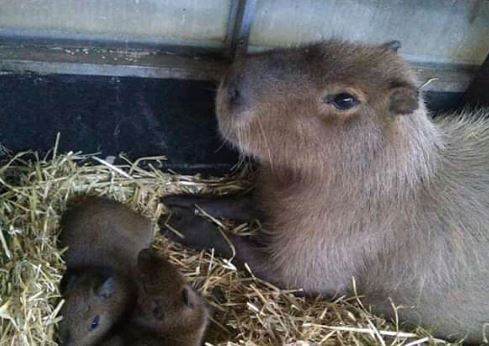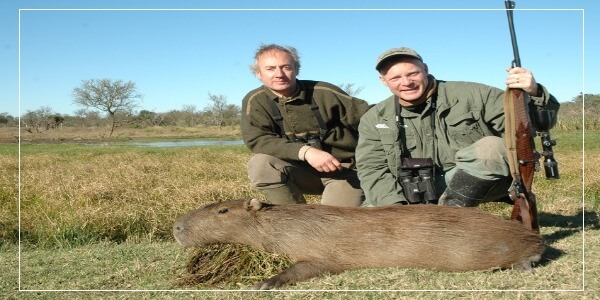Have you ever come across those adorable, giant rodents known as capybaras and found yourself wondering if it’s possible to have one as a pet in Oregon? Well, you’re not alone. Capybaras have gained quite a following in recent years, captivating animal lovers with their unique charm and gentle nature. But before you rush to adopt one of these furry friends, it’s important to understand the legalities, regulations, and responsibilities that come with capybara ownership in Oregon.
It’s essential to remember that while capybaras may be undeniably adorable, responsible ownership is paramount. Understanding the laws and regulations in place ensures both the well-being of the capybara and the harmony of your local community.
Can You Own a Capybara in Oregon?
You can own a capybara in Oregon, but there are certain regulations and requirements that need to be followed. Capybaras are considered exotic animals in Oregon, and ownership is subject to specific laws.
To legally own a capybara, you will typically need to obtain a permit or license from the appropriate state agency. These permits may require an application process, documentation, and payment of associated fees.
What Permits or Licenses are Required to Own a Capybara in Oregon?
In Oregon, owning a capybara as a pet typically requires obtaining the necessary permits and licenses. The specific permits and licenses needed may vary depending on the county or city regulations, so it’s essential to research the local laws. Generally, you would need an exotic animal permit or wildlife possession permit to legally own a capybara.
To acquire these permits, the process usually involves several steps. First, you would need to complete an application form provided by the relevant authorities, such as the Oregon Department of Fish and Wildlife or the local animal control agency. The application form typically requires information about the capybara, including its species, source, and intended purpose of ownership.
In addition to the application, you may need to submit documentation demonstrating that you have the proper facilities and accommodations to house the capybara safely and securely. This may include details about the enclosure’s size, fencing, and other necessary provisions for the well-being of the capybara.
There is usually a fee associated with the permit application, and it’s important to note that obtaining a permit does not guarantee approval. The authorities may conduct inspections to ensure that all requirements are met before granting the permit.
It’s crucial to comply with all permit conditions, including regular renewals, reporting, and any restrictions imposed by the state or local regulations. Failing to obtain the required permits and licenses can result in legal consequences and the confiscation of the capybara.
To ensure compliance with the specific permit and license requirements in Oregon, it’s advisable to consult the local authorities or a wildlife expert familiar with the state’s regulations.
How Long Do Capybaras Live In Captivity?
What are the Care Requirements For Capybaras as Pets In Oregon?
While the idea of sharing your life with a capybara may sound thrilling, it’s crucial to understand that these intelligent and social animals require specialized care to thrive in a domestic setting.
- Diet: Leafy greens such as lettuce, kale, and spinach should be included in their daily meals. It’s essential to provide a balanced diet to ensure their nutritional needs are met.
- Habitat:They require access to a pool or large water source for swimming and staying cool. The land area should have ample space for exercise and should be securely fenced to prevent escape.
- Socialization: Capybaras are highly social animals and should ideally be kept with at least one companion of their own species. They thrive in groups and enjoy interacting with their human caregivers as well. Sufficient socialization and mental stimulation are crucial for their well-being.
- Veterinary Care: Regular veterinary check-ups are essential to monitor the health of capybaras. Vaccinations, parasite control, and dental care should be provided as recommended by a qualified exotic animal veterinarian. Routine hoof care and grooming are also necessary.
- Environmental Enrichment:This can include providing toys, hiding spots, and opportunities for foraging and exploration within their habitat.
- Climate Considerations: Capybaras are native to warm regions, so in Oregon’s cooler climate, it’s important to provide suitable heating options during colder months. Access to shelter and a heated area is necessary to ensure their comfort and well-being.
Where can I Find Reputable Capybara Breeders in Oregon?
Before you embark on the journey of welcoming a capybara into your home, it is crucial to find a reputable breeder who prioritizes the welfare and ethical treatment of these amazing animals.
- Local Exotic Animal Associations: Reach out to local exotic animal associations or clubs in Oregon. They may have resources or connections to reputable capybara breeders within the state. These organizations can provide guidance, recommendations, and possibly even contact information for trusted breeders.
- Online Directories and Forums: Utilize online directories and forums that focus on exotic animal ownership. These platforms often have dedicated sections or threads where reputable breeders are listed or discussed. Engage with the community, ask for recommendations, and gather information about capybara breeders in Oregon.
- Veterinary Recommendations: Consult with exotic animal veterinarians in Oregon. They are likely to have connections within the capybara ownership community and may be able to provide references to reputable breeders.
- Network with Capybara Owners: Connect with existing capybara owners or enthusiasts in Oregon. They can share their experiences and potentially provide information about the breeders they obtained their capybaras from.
How Do Capybaras Survive in the Amazon Rainforest?
How To Get a Pet Capybara Uk [Step By Step]
What are The Risks and Considerations of Owning a Capybara In Oregon?
Owning a capybara in Oregon comes with its share of risks and considerations that potential owners should be aware of. One significant consideration is the capybara’s behavior. Capybaras are social animals and require ample companionship, preferably from their own species. Without proper socialization and interaction, they may become stressed, anxious, or develop behavioral issues. Additionally, capybaras have unique dietary needs, primarily consisting of high-fiber vegetation, which can be challenging to provide in certain regions of Oregon.
Health concerns are another aspect to consider. Capybaras are prone to specific health issues, such as dental problems and skin conditions, which require regular veterinary care. Finding an experienced exotic veterinarian who is knowledgeable about capybaras can be crucial for their well-being. Furthermore, capybaras are large animals, and their size and strength must be taken into account, particularly if there are young children or other small pets in the household.
They may unintentionally cause harm due to their natural behaviors, such as grazing or playing. Legal liabilities also need consideration. While capybaras may be legal to own in Oregon, there might be local restrictions or regulations in specific cities or counties. Additionally, responsible ownership involves ensuring secure enclosures, preventing escapes, and abiding by any local ordinances.
Are There Any Capybara Rescue Organizations In Oregon?
Oregon is home to several capybara rescue organizations dedicated to providing care and shelter for these unique animals. These organizations focus on rescuing capybaras in need, whether they were abandoned, surrendered, or found in distressing situations. By offering a safe haven, they ensure the well-being and proper care of capybaras until suitable forever homes can be found.
Capybara rescue organizations in Oregon play a vital role in rehabilitating these animals, addressing any physical or behavioral issues, and providing socialization opportunities. Their dedicated staff and volunteers work tirelessly to ensure that capybaras receive the attention, enrichment, and veterinary care they require.
These rescue organizations also serve as valuable resources for individuals interested in adopting a capybara. They assess potential adopters, educate them about capybara care and responsibilities, and match them with suitable capybaras based on the animals’ needs and the adopters’ circumstances.
If you’re considering adding a capybara to your family, reaching out to these rescue organizations in Oregon is a great starting point. They not only provide the opportunity for adoption but also offer guidance and support throughout the process. By adopting from a rescue organization, you can provide a loving home to a capybara in need and contribute to their welfare and conservation efforts.
Capybaras Vs Beavers – Similarities & Differences [All You Should Know]
How Do Capybaras Maintain Homeostasis? [Answered]
Conclusion
Owning a capybara in Oregon is not a straightforward matter. While these unique and fascinating creatures make adorable pets, there are several legal and practical considerations to keep in mind. Oregon, like many states, has strict regulations surrounding exotic animal ownership, and capybaras often fall into this category.
Before considering bringing a capybara into your home, it is essential to thoroughly research and understand the laws and regulations specific to your area. Contacting the local wildlife or exotic animal control authorities can provide you with accurate and up-to-date information on the legality of capybara ownership in your county or city.

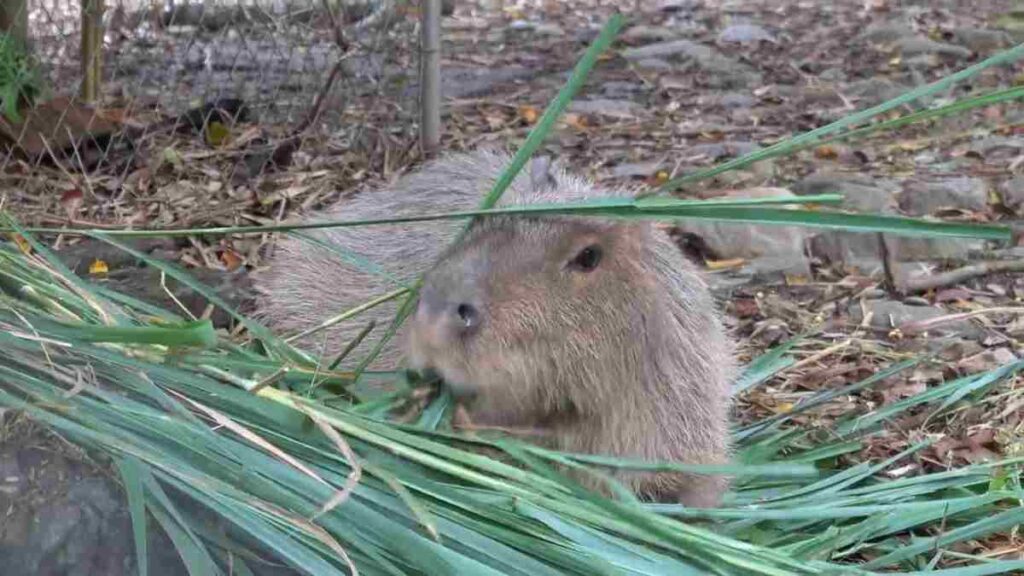
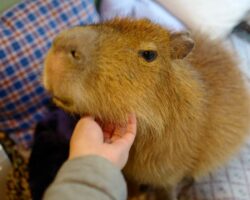
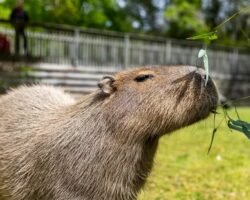
![Capybara Meat And Its Culinary Uses - [Every You Should Know] Capybara Meat & Culinary Uses](https://capybaratips.com/wp-content/uploads/2023/03/Capybara-meat-250x200.webp)
![Where Can I Buy a Capybara Near Me? - [Recommended] Where Can I Buy a Capybara Near Me](https://capybaratips.com/wp-content/uploads/2023/03/Near-Me-250x200.webp)


